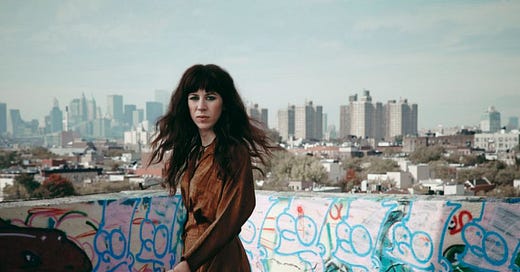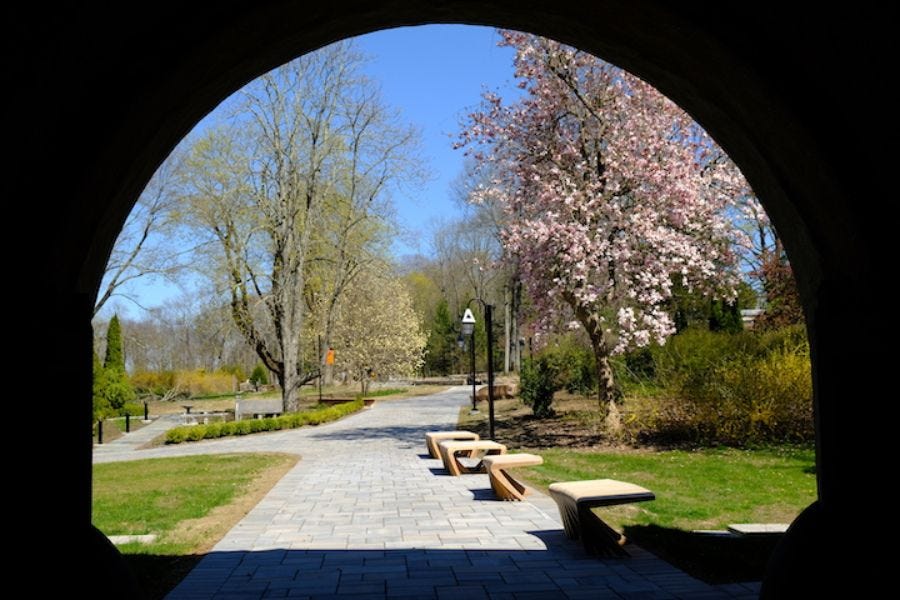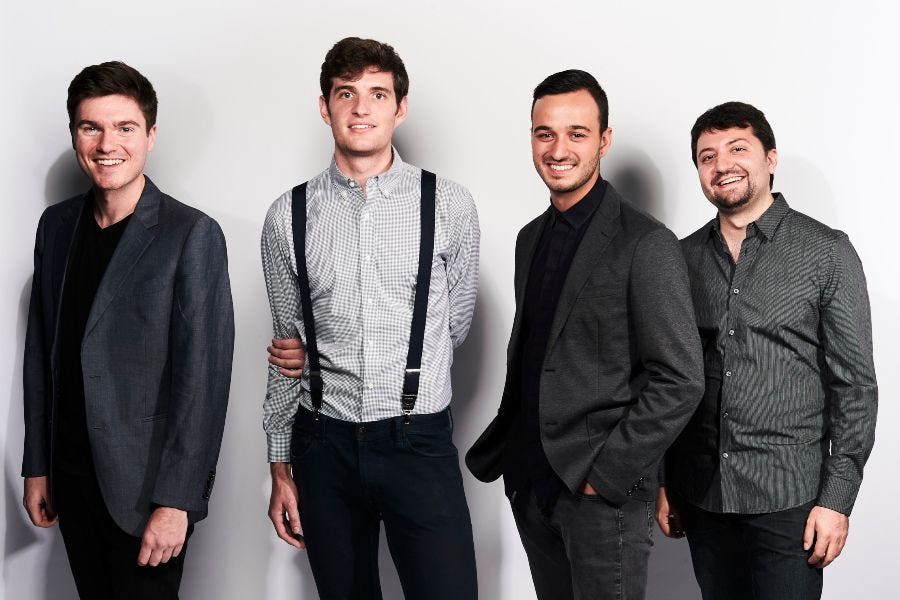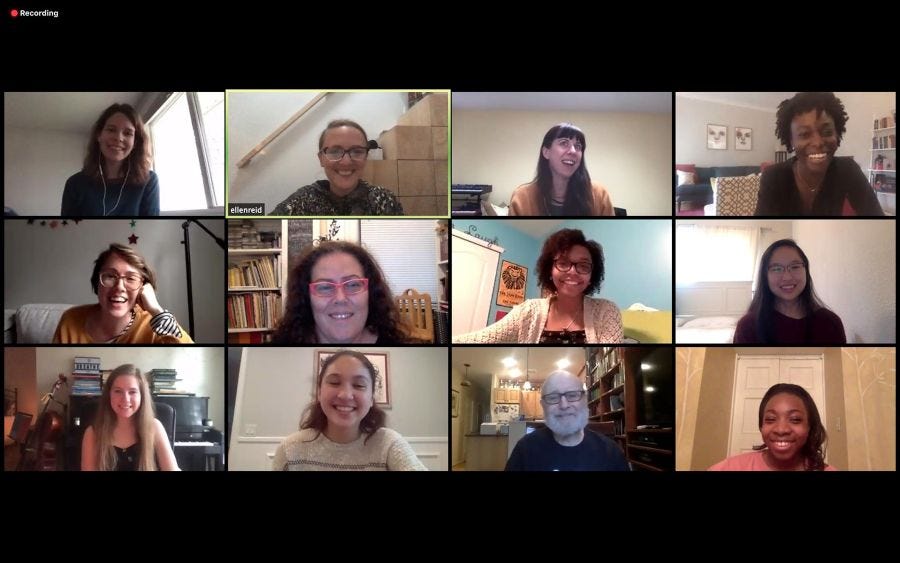All Due Fanfare
Timely news, streaming highlights, and an interview with composer Missy Mazzoli about missed milestones, unanticipated opportunities, and what she's looking forward to most…
News! News! News!
Center Walk, Caramoor Photograph: Gabe Palacio/Caramoor
Caramoor, a verdant seasonal destination for music in Katonah, NY, this morning announced ambitious plans for a hybrid summer season, including recitals livestreamed from the Music Room of the Rosen House, as well as four judiciously conceived live concerts and sound-art installations outdoors in late summer. Cleverly designated “Summer 20/2.0,” the plan migrates classical music programming online, at least partly in order to avoid intrusive amplification. The schedule is dotted with new and recent works, including premieres by Chris Cerrone and Anna Clyne; sound-art installations include works by Annea Lockwood and Bob Bielecki, Spencer Topel and Hana Kassem, and Trimpin—whose sound sculpture in “C” will “play” new miniatures by Cerrone, Clyne, Missy Mazzoli, and Nico Muhly. For complete details, read the press release.
Closer to home (for this writer, at least), the Naumburg Orchestral Concerts series – a staple of New York City’s summertime musical life since 1905, and a series increasingly amenable to contemporary music in recent years – has been canceled outright this year. Admirably, artists and ensembles who were scheduled to appear this summer – including the East Coast Chamber Orchestra, The Knights, and A Far Cry – will be paid in full. The announcement holds open the possibility for a resumption of live programming, should circumstances allow it. Read the complete statement on the series website.
Long Beach Opera, the company that last summer mounted the world premiere run of the work that won this year’s Pulitzer Prize, Anthony Davis’s The Central Park Five, yesterday announced another programming coup: Comet/Poppea, a fantastical fusion of Monteverdi’s The Coronation of Poppea and The Comet, a new opera by composer George Lewis and librettist Douglas Kearney, based on a science-fiction short story by W.E.B. DuBois. Conceived by director Yuval Sharon, founder of experimental-opera company The Industry and presently interim artistic advisor for Long Beach Opera, Comet/Poppea is designed to incorporate two partner organizations: the Philharmonia Baroque Orchestra in Poppea and American Modern Opera Company in The Comet. The show is slated to have its world premiere in New York City June 2-6, 2021, with venues and performers to be announced, before moving on to Long Beach (June 20-27) and San Francisco (dates TBA). Read Jessica Gelt in the Los Angeles Times on the Long Beach season – which also includes works by Peter Maxwell Davies, Philip Glass, Arnold Schoenberg, and Kate Soper – here.
Details of the next Bang on a Can Marathon, already announced as taking place online on Sunday, June 14, have been announced. The six-hour concert will include performances by Nik Bärtsch, Rhiannon Giddens, Roscoe Mitchell, Shara Nova, Terry Riley, and Conrad Tao, among others, and the program includes no fewer than 10 newly commissioned premieres. The program is now posted at marathon2020.bangonacan.org, where the concert will stream starting at 3pm on June 14.
Streaming Highlights
Sandbox Percussion Photograph: Kjell van Sice
All times are given in Eastern Daylight Time, current for New York City.
May 21, 8pm, live: Flutist Kelley Barnett, performing under the auspices of Ensemble Mise-En, presents a live recital featuring world premieres by Seong Ae Kim and Nick Pauly, alongside further works by Kaija Saariaho, Jonathan Favero, Alicia Terzian, and Yeabon Jo. Free; place.mise-en.org/#live
May 22, 1pm, recorded: Appearing as part of the Trinity Wall Street series “Comfort at One,” Sandbox Percussion presents a video realization of one of the first pieces they learned together, almost a decade ago: extremes, by Jason Treuting, created at home under lockdown conditions with whatever materials were at hand. The video will stream live on the Trinity Wall Street Facebook page and Twitter feed, and then will be archived on the church’s website. Free; trinitywallstreet.org
May 22, 7pm, recorded: The Iranian Female Composers Association, subject of an admirable New York Times profile by Ryan Ebright yesterday, was to have been featured in a Joe’s Pub concert by the International Contemporary Ensemble last Saturday. To make up for the loss of that concert, you can watch the streaming premiere of a previous ICE event devoted to IFCA composers, filmed last August during Lincoln Center’s Mostly Mozart Festival. (I attended that concert, and it was sensational.) Free; youtube.com/InternationalContemporaryEnsemble
May 22, 9pm, live: Pianist Karl Larson, an adventuresome soloist and one-third of the groundbreaking trio Bearthoven, performs SOVT, a hypnotic, exactingly nuanced hour-long work by Sarah Hennies. Larson’s appearance is part of an Experimental Sound Studio Quarantine Concerts program assembled by The Renaissance Society, in which he’ll be preceded by C. Spencer Yeh and Theodore Cale Schafer. Free, with suggested donation; subscribers watch ad-free. ess.org/the-quarantine-concerts
May 23, 2-6:30pm, live: Also from Experimental Sound Studio, the third Sequesterfest event produced by Chicago venue/gallery Corbett vs. Dempsey includes several titans of the free-improv world: keyboardist Steve Beresford at 2pm, saxophone colossus Peter Brötzmann at 3:30pm, and drummer Hamid Drake at 6pm. The bill also includes Rebekah Heller, Rob Mazurek, and a “halftime show” involving artists’ films. Free, with suggested donation; subscribers watch ad-free. ess.org/the-quarantine-concerts
May 24, 5pm, live: Cellist Jeffrey Zeigler performs a world-premiere commissioned work by composer Yuan-Chen Li as part of the American Composers Orchestra series Connecting ACO Community. Ticketholders will receive a private link to join the performance, which will be archived afterward on the orchestra’s website and social-media channels, and at Music on the Rebound. $5; americancomposers.org
Interview: Missy Mazzoli
Missy Mazzoli Photograph: Marylene May
Composer Missy Mazzoli had big plans for the spring, to say the least. At the Chicago Symphony Orchestra, where she’s been in residence this season, an orchestral premiere was to rub shoulders with two Beethoven symphonies on a program conducted by Riccardo Muti, and a festive anniversary collaboration between the orchestra and the city’s fabled Association for the Advancement of Creative Musicians (AACM), conceived by Mazzoli, was to include premieres by improvising composers Nicole Mitchell and Wadada Leo Smith.
Luna Composition Lab, the pioneering program Mazzoli established with fellow composer Ellen Reid, would have presented its celebratory annual concert at Merkin Hall. And in June, the Metropolitan Opera was set to present Breaking the Waves at the Brooklyn Academy of Music—another groundbreaking collaboration, meant to introduce Mazzoli to the Met audience as it awaits Lincoln in the Bardo, her commissioned adaption of the George Saunders novel.
Then came COVID-19, with its sweeping cancelations.
Nevertheless, Mazzoli has found herself with cause to celebrate. She’s had a succinct premiere played by the violinist Jennifer Koh, and is working on another web-oriented premiere for the Guggenheim Museum. On May 29, a filmed performance of Breaking the Waves will have its online premiere as part of the Opera Philadelphia initiative Digital Festival O. And on June 1, Mazzoli and Luna Lab will be part of “Day of Musical Action,” a four-hour streaming event celebrating the Kaufman Music Center and its remarkable creative family with live performances and more.
Speaking by telephone from the Catskills, where she is sequestered with librettist Royce Vavrek, her close collaborator, Mazzoli talked about the present status of major projects postponed and , as well as the unique and unanticipated new opportunities that have arisen during this period of challenge and isolation. (The interview was edited for length and clarity.)
STEVE SMITH: My first question is, quite simply, how are you feeling these days?
MISSY MAZZOLI: I’m feeling things that I’ve never felt before, so I don’t exactly have words for them. I’m always at a loss for what to say when someone says, “How are you?” It’s like, I don't know. Because, yeah, there’s been obviously the crippling loss of work, and the uncertainty about the future of our field, everything that everyone has been talking about for months. But I can’t help but feel a certain amount of relief and joy at being able to do something totally new that was unexpected.
So I’m trying to see this time in every possible way: not just creatively, but how I relate to my parents, and how much I talk to my friends, and who I’m reaching out to. It’s a total reset, so I’m really enjoying that. I feel guilty for having any sort of fun at all during this time, but that’s the truth.
So then, you actually are reaching out and connecting a lot more than you would normally be able to, with your typical work schedule?
Exactly. I’ve had some group Zooms with Beth Morrison and her posse, so there’s like 25 composers on that Zoom – Paola Prestini, Julian Wachner, Jodie Landau – and directors and artists and set designers, and we’re all together for the first time in our lives. And I’m quarantined with Royce, and we’ve been reaching out to all of our collaborators as we’re trying to figure out how to work on these projects in process. We had an amazing two-hour conversation with George Saunders on Zoom the other night.
Obviously, this pandemic is awful. But if this hadn’t happened, I don’t know that we would’ve taken the time to do that at this stage. And it’s like: who gets to talk to George Saunders during a pandemic? I just felt so lucky.
Have you been participating much in this new sort of performing-arts scene that has bubbled up during this time, the increasing wave of live-streamed performances?
Oh, yeah, I’m doing a couple of projects… I’ve had to limit what I’m participating in, just because I’ve been reminded of the fact that composing is just as hard now as it was before. In the beginning I was saying yes to everything, and I thought, I’ll just find some weird secret well of time and energy to write so much more music than usual. It doesn’t happen.
I participated in Jenny Koh’s Alone Together series, and she premiered a new solo violin piece. I’m part of this Cincinnati Symphony Fanfare Project, so I’m writing a short fanfare for their concertmaster.
And then this Guggenheim commissioning series, I’m a part of that. They’re doing virtual commissions, and they left it very open-ended: they asked for pieces three to five minutes long that you could somehow create yourself, at home. I’m creating a piece for electronics and piano and sampled voice, and the singer is Anthony Roth Costanzo. So Anthony recorded himself singing in his apartment and sent me that recording, and that’ll be the sampled vocal part of this composition. And then Adam Larsen, who did projection designs for Breaking the Waves and is an amazing video artist, is doing a video for it.
This is the Guggenheim Museum Works & Process series you’re talking about?
Exactly, yes. They really range from people tap dancing in abandoned playgrounds to, you know, Conrad Tao did one. And I would have never done this project – or I don’t think that I would have had the time to do this – without being in quarantine.
Not to throw cold water on all of this, but right around now would have been a climactic few weeks in your Chicago Symphony Orchestra residency. I’m curious now about the events that did not transpire, and whether any conversations are going on about resuscitating those things down the line.
Yes. I find that I get sad as the actual dates roll around… yesterday would have been my last MusicNOW concert in Chicago. Last month, I would have had the premiere of my newest orchestral work with the CSO. Nothing is certain yet, and nothing has been publicly announced, but I can say that I’m in constant talks with the artistic administration there about rescheduling things for the fall.
So then those things are being discussed. It’s not just a case of, “well, that would have been nice.”
No, not at all. It’s really important to me that this programming happens in some way, because my residency was supposed to end in August, so this would have been my last little thing with them. They’ve been really receptive to essentially extending it, and I’m in talks with them to reprogram these things.
We can’t put too definite a date on anything, anyway, considering that the goalposts seem to move every single day. We hear that there’s going to be no live music in public until 2021, and then we hear about programming this summer with outdoor events and social distancing. Things are changing moment by moment.
I just got an email from the dramaturge at Houston Grand Opera, and they’re like, “Texas is open!” And I’m like, please don’t go outside…
You’re working with Houston Grand Opera?
Yes, that’s announced: they’re doing Breaking the Waves this spring. Breaking the Waves is scheduled to happen at LA Opera in March ’21, and then Houston Grand Opera is scheduled to do it in April.
Are these productions we’ve seen previously?
In L.A. they’re going to do James Darrah’s original production, which I’m thrilled about. And then in Houston, it will be the Tom Morris production that was premiered at Edinburgh last summer.
The Edinburgh production is the one that would have been coming to BAM next month, performed by the Metropolitan Opera with Yannick Nézet-Séguin. I have to assume that for myriad reasons, the likelihood of that being rescheduled is probably very small. That has to be a real blow, even with Lincoln in the Bardo moving forward.
There’s been no talk of rescheduling Breaking the Waves, from BAM or the Met. They just canceled it, which is heartbreaking. It’s hard as a composer, because I feel responsible financially and artistically and emotionally for everyone who’s part of these operas. I feel tremendous gratification when I can give people work, and when that is taken away from them… especially for these singers like Sydney Mancasola, who was Bess in the Edinburgh production, and actually, she’ll be singing Bess in James's production in L.A. But this would have been a big deal, for her to perform in New York with the Met Orchestra under Yannick, and so that loss is multiplied.
The impression that I got from both institutions was that there was no way that it was going forward, and that the Met really wants to focus on Lincoln in the Bardo. Obviously I feel super upset, but it’s funny with these projects: sometimes, the bigger they are, the harder they fall. It’s not flexible; it’s not a concert you can reschedule easily. But BAM has expressed interest in doing something new with me in the next few years, and I look forward to that.
Meanwhile, in an instance of serendipity, you do have this big internet premiere of Breaking the Waves coming up next week.
Which is huge. And I really love Opera Philadelphia so much. Just for so many reasons, I love them more and more all the time, and I think that this is such a great idea. We made this film of the original production, and no one has been able to see it. It was something more advanced than just an archival version, but we never released it. So this is the perfect opportunity for people to see something. It’s not just an archival one-camera shot of the show; it’s a truly artistic document of it.
I can imagine that very vividly now, having seen Denis & Katya and We Shall Not Be Moved online. The production values and camera work were really impressive.
I will say that with opera on film, you lose the kinetic energy between you and the performer. That’s something I’ve really realized now, being in quarantine and watching all these fantastic operas on screen. I watched Angel’s Bone and the Gloriana that the Royal Opera House in London put out, and there’s something vital in the air that is missing.
But I do think that for anyone who has any interest in Breaking the Waves, especially if you couldn’t ever see a production… and there’s no commercial recording out yet. We’re trying to get that in the works, but right now there’s no commercial recording. And there’s no place to view this video online yet, so this will truly feel like a premiere of sorts.
You’ve already mentioned the Cincinnati Symphony Fanfare Project, but you just posted the news about it on social media yesterday, and it feels very fresh. When the orchestra reached out to you, what were they looking for?
Essentially, a one-minute fanfare for a soloist. They reached out and asked if I’d be interested, and then asked what instrument I’d like to write for. I thought it’d be fun to do a piece not for the usual fanfare instruments—to imagine, what would a fanfare sound like for a solo string instrument? This is also a way of starting my relationship with that orchestra. We’re in talks about future projects, and this is a great way to establish a relationship with the players, which is something that is so important and not often talked about.
The project has a historical precedent: Copland’s Fanfare for the Common Man was commissioned as part of a similar sort of project.
Right: the Cincinnati Symphony commissioned more than a dozen fanfares during World War II.
And Copland’s is the most famous. This was modeled on that, but it’s for a single player.
Ellen Reid (top, second from left), Missy Mazzoli (top, second from right) and Luna Composition Lab mentors and students on Zoom Image courtesy Missy Mazzoli
You and Ellen Reid and your Luna Lab collaborators have just completed a distanced and isolated lab. How were you able to alter Luna to accommodate present conditions?
Well, the good thing about Luna Lab is that it’s 90 percent online already. Even though people focus on the splashy festival that we have every year, where we fly our composers to New York and take them backstage at the Met and the New York Phil and have them meet Renée Fleming and all these people, the really important work is the work that they do all year round with their mentors online. They’re from all over the country, and they're Skyping with their mentors once every two weeks for composition lessons.
It's disappointing for them that we don't get to hear their works in person right away. We are working on rescheduling that for the fall. And this year we also started a partnership with the Los Angeles Chamber Orchestra, which is huge for us. What we had planned to do was have our New York festival, and then fly those same composers to L.A. for an L.A. version of the festival, and then we would add three new young female composers to that program who are based in the L.A. area. So they’d get three lessons with mentors in Southern California, and then they’d join our official Luna Lab fellows for a concert. And that was supposed to happen in May—but, again, we're trying to reschedule it for fall.
We've emphasized to them that we’re still committed to giving them a live concert of their pieces—it's just a question of when. But the cool thing is that we still had a festival online for them, and we had a bunch of master classes through Zoom with Jennifer Koh, Nathalie Joachim and Caroline Shaw did one together, which was amazing, and Ashley Jackson, the harpist. And then we had a sort of leadership panel with Peggy Monastra from G. Schirmer, [publicist and artist liaison] Sarah Baird Knight, Elena Moon Park of Found Sound Nation, and Elena Park from the Met, talking about different roles you can do in music that are not composing.
We felt bad, because they weren’t going to get to hear their music live, so all the students wrote little excerpts for these players, which is something that we don't usually have time to do when we have this in person. They all wrote little pieces for Jenny Koh, they all wrote little vocal things for Caroline, little flute things for Nathalie, and got feedback on them instantly. It was amazing. It was so gorgeous. And one of our students, KiMani Bridges, who lives in Kentucky, had her 18th birthday on one of the days of the festival. We all made funny signs and showed them to her. It was just lovely and touching to be able to have a tiny shred of community right now.
When we all return to normalcy, what are you looking forward to most?
Two things pop into my head. One, I’m going to go straight to the Pyramid Club on the Lower East Side and I’m going to have a little mini dance party bender. I don’t care who’s with me; I need to breathe the sweat of other strangers. [Laughs]
And then also… I mean, look, it’s cliché, but just hearing anyone making music in front of me will be profoundly moving. Anthony sent me the raw audio of him singing in his apartment, and I just burst into tears. I was like, this is like an Anthony Roth Costanzo concert for one, I’m the only person to hear this right now, and how beautiful is this? And I think when he’s in front of me singing, it’s going to be even more spectacular.
A boring answer, for a musician, but I just need people to make art in front of me. And I can’t wait to just give them all my money.
Opera Philadelphia presents Breaking the Waves online as part of Digital Festival O, premiering on May 29 at 8pm EDT; operaphila.org. Missy Mazzoli appears during the Kaufman Music Center online gala concert “Day of Musical Action,” streaming June 1 from 4-8pm EDT on the center’s Facebook page.
Coming Soon…
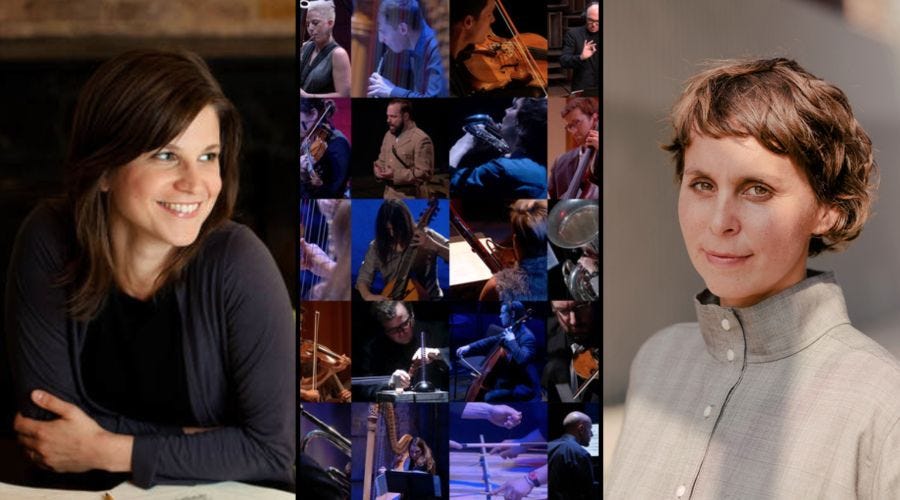
International Contemporary Ensemble co-artistic director Ross Karre and composers Suzanne Farrin and Ashley Fure share details about a concert ICE will present online on May 28, featuring the world premieres of pieces that involve mutual isolation, long-distance collaboration, and audience participation.
